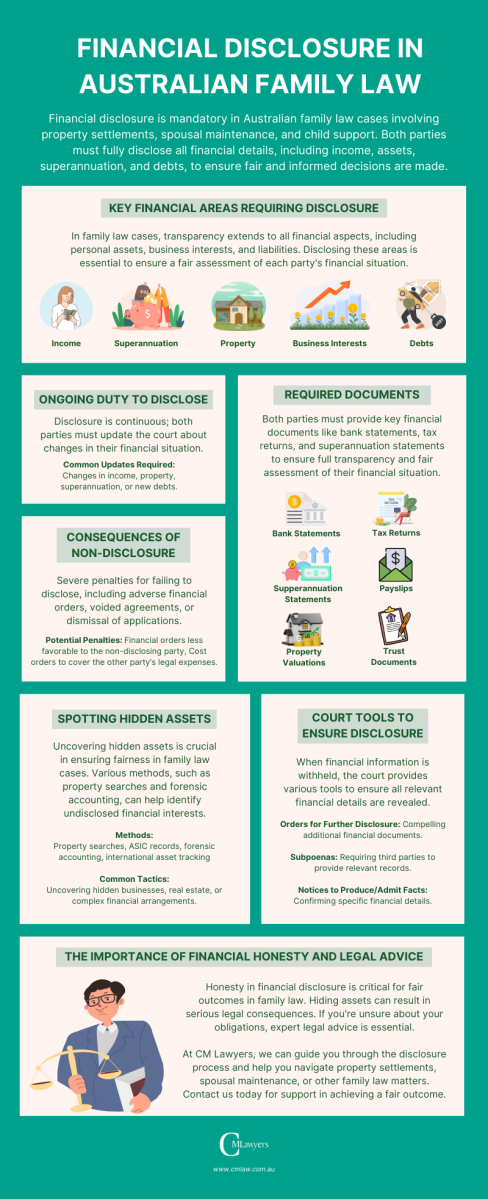Understanding Financial Disclosure in Australian Family Law
In Australian family law, transparency in financial matters is not just important—it’s a legal requirement. Financial disclosure is vital when dealing with property settlements, spousal maintenance, or child support. Both parties must provide a full and honest account of their financial circumstances, including income, expenses, property, superannuation, and debts, regardless of whether these are located in Australia or overseas. This requirement is designed to ensure that all decisions related to the division of assets or financial support are made fairly, based on complete and accurate information.
Check out our infographic below for a quick overview of financial disclosure in Australian Family Law. You can also find more in-depth information about the topic after the photo.

Financial disclosure applies not just to personal assets but also to business interests, investments, and any financial connections that could impact a party’s ability to meet their obligations or claims. It’s not enough to provide a rough estimate; the courts require detailed and verified information, making this a critical step in any family law matter.
Key Financial Areas Requiring Disclosure:
- Income from all sources (employment, investments, rental properties, etc.)
- Superannuation holdings and statements
- Property owned, including any jointly held assets
- Business interests and associated financial statements
- Debts and liabilities, including personal loans, credit cards, and mortgages
Ongoing Duty to Disclose
The duty to disclose financial information is continuous throughout the case, not a one-time event. According to the Federal Circuit and Family Court of Australia (Family Law) Rules 2021, both parties are required to promptly inform the other party and the court of any significant changes in their financial situation. This includes acquiring new assets, incurring debts, or experiencing changes in income or expenses. The court relies on this information to make fair decisions, and failure to update financial disclosures can result in severe penalties, including fines or unfavorable judgments.
Common Updates Required:
- Changes in employment status or income levels
- Acquisition or sale of property or significant assets
- Changes to superannuation or pension entitlements
- New financial obligations or debts
What Documents You Need to Provide
To meet financial disclosure obligations, specific documents must be provided to the other party and the court. This ensures transparency and allows for a thorough assessment of each party’s financial standing. The required documents typically include bank statements, tax returns, payslips, superannuation statements, and other relevant financial records. These documents help paint a complete picture of an individual’s financial situation and are critical in cases involving complex financial arrangements, such as business interests or trusts.
Typical Documents Required:
- Bank Statements: Showing account balances, transactions, and any transfers.
- Tax Returns: Including personal and business tax returns for the past three years.
- Superannuation Statements: Detailing current balances and recent contributions.
- Payslips: To verify income from employment.
- Business Financial Statements: Including profit and loss statements, balance sheets, and business tax returns.
- Property Valuations: For real estate owned by either party.
- Trust Documents: Including trust deeds and financial statements for any trusts where a party is a beneficiary.
What Happens If You Don’t Disclose
Failing to fully disclose financial information can lead to severe consequences. The court has broad powers to address non-disclosure, including making adverse financial orders, voiding agreements, or even dismissing applications. In some cases, the court may order the non-disclosing party to pay the other party’s legal costs, significantly increasing the financial burden. Non-disclosure can also damage credibility, making it harder to achieve favorable outcomes in negotiations or court decisions.
Potential Penalties:
- Adverse Financial Orders: The court may divide assets in a way that is less favorable to the non-disclosing party.
- Voiding Agreements: Previously reached agreements can be set aside if financial information was withheld.
- Dismissal of Applications: The court may refuse to hear your case if you fail to comply with disclosure requirements.
- Cost Orders: You may be ordered to cover the legal costs incurred by the other party.
How to Spot Hidden Assets
If you suspect that the other party is not being truthful about their financial situation, there are several methods to uncover hidden assets. These include conducting property searches, examining company records through the Australian Securities and Investment Commission (ASIC), and hiring forensic accountants to investigate complex financial arrangements. In some instances, international experts may be needed to track overseas assets, especially in cases involving significant wealth or complex investment structures.
Common Tactics for Uncovering Hidden Assets:
- ASIC Searches: To identify undisclosed business interests or directorships.
- Property Searches: To discover hidden real estate, mortgages, or encumbrances.
- Forensic Accounting: To analyze financial records for signs of asset concealment or financial misrepresentation.
- International Asset Tracking: Engaging experts to locate and assess overseas assets.
How the Court Can Help
When suspicions arise about incomplete financial disclosure, the court offers several tools to compel the other party to provide the necessary information. You can request additional disclosure through court orders, issue subpoenas to third parties for documents, or use notices to produce or admit facts. These measures help ensure that all financial details are revealed, allowing for a fair and informed resolution of the case.
Court Tools Available:
- Orders for Further Disclosure: Directing the other party to provide additional financial documents.
- Subpoenas: Requiring third parties, like banks or employers, to submit relevant documents.
- Notices to Produce/Admit Facts: Forcing the other party to confirm or provide specific financial details.
- Undertakings: Formal commitments from the other party to maintain full and honest disclosure.
Final Thoughts: The Importance of Financial Honesty
Honesty in financial disclosure is critical to achieving a fair outcome in family law cases. Attempting to hide assets or mislead the court can have serious legal consequences and complicate the resolution process. Adhering to disclosure rules not only protects your interests but also fosters a transparent and fair legal environment. If you are navigating a family law matter and are uncertain about your disclosure obligations, seeking expert legal advice is essential.
At CM Lawyers, our experienced team can guide you through the financial disclosure process and help you understand your rights and responsibilities. Whether you need assistance with property settlements, spousal maintenance, or any other family law issue, we are here to support you every step of the way. Contact us today to discuss how we can help you achieve a fair and just outcome.



